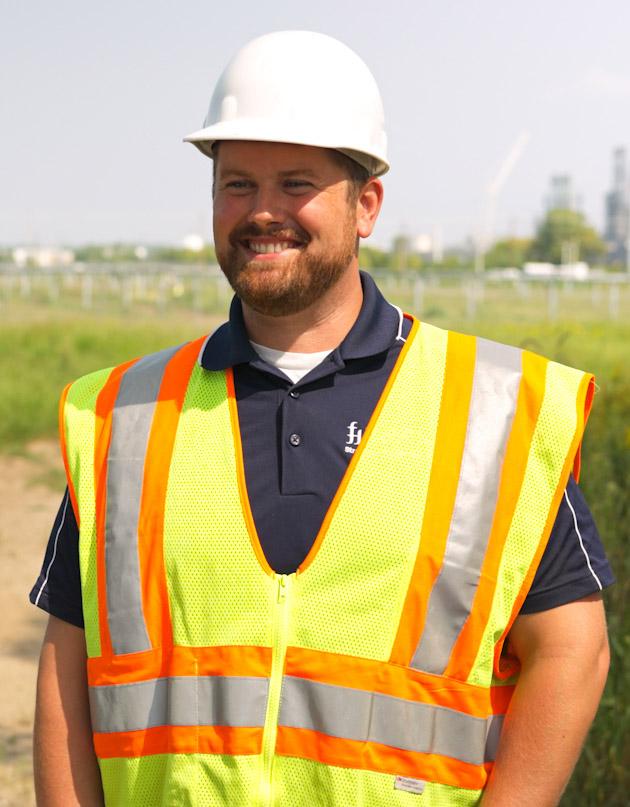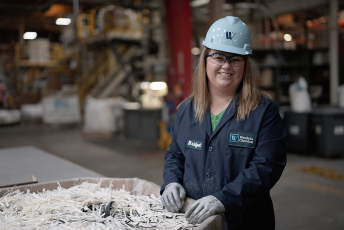
Zak Potratz is a project manager at Flint Hills Resources and has a background in electrical engineering.
Pundits and politicians often frame energy technologies like solar generation and liquid fuels as competitors, not companions. But a visit to Flint Hills Resources’ Pine Bend refinery might change their minds.
At Pine Bend, the refinery’s solar farm stretches beyond view, showing how downstream facilities are evolving to meet the demands of the modern world. During a recent visit, we asked Flint Hills Resources Project Manager Zak Potratz to tell us about his work on the solar project, its impact on the refinery, and beyond.
AFPM: Why did Flint Hills Resources install a solar farm?
Zak: We've had other electrical generation projects in the past and we've wanted to get more creative with the different ways that we generate power and reduce energy costs at the refinery. This solar farm provides 45 megawatts (MW) of power to the refinery. That's about a third of our energy usage and would also be about a third of the energy usage of a moderate sized city. Over 8,400 homes could be powered by that much electricity and that is an extremely unique opportunity.
AFPM: How big is this solar farm compared to other large-scale solar projects in the U.S.?
Zak: This is the largest solar generation behind-the-meter facility in the United States. It’s 350 acres. You can drive for a mile down the road and you will still be at our renewable energy facility. Most opportunities for smaller plants or neighborhood solar gardens are in the 1MW range — enough to power around 500 houses or something in that range and again, our facility generates enough to power more than 8,400 homes. But because we need so much electricity to run our facility, we're able to take a full 45MW.
AFPM: A lot of people don't believe that you can have renewable energy and traditional energy working together. What would you say to that?
Zak: There's no reason that renewable energy can't play a part in traditional energy generation. We're going to need transportation fuels, plastics and asphalt for a long time, but that does not mean there's not a place in the United States and in the world for renewable energy generation. Those two can coexist really well. We're able to utilize energy generated from solar the same way we would from any other energy source and really make that a part of the energy mixture here.
AFPM: How does the use of solar power affect the emissions profile of the facility?
Zak: I've got statistics that show solar power does reduce the emissions that we would see from power plants off site sending us power, perhaps through coal, oil or natural gas generation. So, projects like this are definitely a move in the right direction and really reduce the industry's impact from an environmental perspective.
AFPM: We talk about the dual challenge to provide products like the fuels and petrochemicals that make modern life possible, while also reducing our impact on the environment. Does this project fit into that?
Zak: We are going to continue to need transportation fuels, asphalt for our roads and petrochemicals to make modern life possible. The challenge, and I think it's an exciting challenge, is to continue to solve these issues and move forward in ways that make us more efficient — to have more of a stewardship mindset long into the future.
AFPM: You have young kids. What does the responsibility of environmental stewardship mean to you as a father?
Zak: I have two young boys and it's really exciting to work on projects like this because I do think that it's going to create a world that's better for them to live in. I'm excited that, I think, they can be proud of their dad for working at a facility like this where we use renewable energy.
Zak Potratz and Flint Hills Resources’ solar project are featured in AFPM’s We Make Progress campaign. To learn more, visit wemakeprogress.org.
The American Fuel & Petrochemical Manufacturers (AFPM) is the leading trade association representing the makers of the fuels that keep us moving, the petrochemicals that are the essential building blocks for modern life, and the midstream companies that get our feedstocks and products where they need to go. We make the products that make life better, safer and more sustainable — we make progress.


